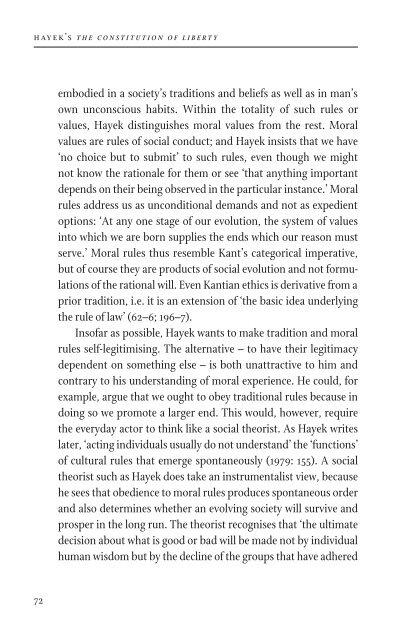Hayek's The Constitution of Liberty - Institute of Economic Affairs
Hayek's The Constitution of Liberty - Institute of Economic Affairs
Hayek's The Constitution of Liberty - Institute of Economic Affairs
You also want an ePaper? Increase the reach of your titles
YUMPU automatically turns print PDFs into web optimized ePapers that Google loves.
h ay e k ’ s t h e c o n s t i t u t i o n o f l i b e r t y<br />
t h e u s e a n d l i m i t s o f k n o w l e d g e<br />
embodied in a society’s traditions and beliefs as well as in man’s<br />
own unconscious habits. Within the totality <strong>of</strong> such rules or<br />
values, Hayek distinguishes moral values from the rest. Moral<br />
values are rules <strong>of</strong> social conduct; and Hayek insists that we have<br />
‘no choice but to submit’ to such rules, even though we might<br />
not know the rationale for them or see ‘that anything important<br />
depends on their being observed in the particular instance.’ Moral<br />
rules address us as unconditional demands and not as expedient<br />
options: ‘At any one stage <strong>of</strong> our evolution, the system <strong>of</strong> values<br />
into which we are born supplies the ends which our reason must<br />
serve.’ Moral rules thus resemble Kant’s categorical imperative,<br />
but <strong>of</strong> course they are products <strong>of</strong> social evolution and not formulations<br />
<strong>of</strong> the rational will. Even Kantian ethics is derivative from a<br />
prior tradition, i.e. it is an extension <strong>of</strong> ‘the basic idea underlying<br />
the rule <strong>of</strong> law’ (62–6; 196–7).<br />
Ins<strong>of</strong>ar as possible, Hayek wants to make tradition and moral<br />
rules self-legitimising. <strong>The</strong> alternative – to have their legitimacy<br />
dependent on something else – is both unattractive to him and<br />
contrary to his understanding <strong>of</strong> moral experience. He could, for<br />
example, argue that we ought to obey traditional rules because in<br />
doing so we promote a larger end. This would, however, require<br />
the everyday actor to think like a social theorist. As Hayek writes<br />
later, ‘acting individuals usually do not understand’ the ‘functions’<br />
<strong>of</strong> cultural rules that emerge spontaneously (1979: 155). A social<br />
theorist such as Hayek does take an instrumentalist view, because<br />
he sees that obedience to moral rules produces spontaneous order<br />
and also determines whether an evolving society will survive and<br />
prosper in the long run. <strong>The</strong> theorist recognises that ‘the ultimate<br />
decision about what is good or bad will be made not by individual<br />
human wisdom but by the decline <strong>of</strong> the groups that have adhered<br />
to the “wrong” beliefs’ (35–6). Social actors, however, perceive<br />
moral rules as ‘a value in itself ’ and do not require instrumentalist<br />
or expedient reasons for obeying them.<br />
Another way to legitimise traditional rules would be to seek<br />
support from religion, but Hayek, as a scientist, had refused<br />
throughout his career to take this path. He rejects all causal explanations<br />
that appeal to invisible essences or hidden spiritual forces,<br />
since these amount to superstition. Nevertheless, he concedes that<br />
there are ‘good reasons why any person who wants to live and act<br />
successfully in society must accept many common beliefs, though<br />
the value <strong>of</strong> these reasons may have little to do with their demonstrative<br />
truth.’ This requirement ‘applies to all our values,’ but ‘it<br />
is most important in the case <strong>of</strong> moral rules <strong>of</strong> conduct’ (64–5).<br />
In this guarded and even cryptic statement, Hayek is silent<br />
as to whether these ‘common beliefs’ have a religious character<br />
and whether they might serve to legitimise the moral rules to<br />
which they are attached. Much later, in <strong>The</strong> Fatal Conceit, Hayek<br />
addresses these issues directly. He wonders whether he has<br />
underestimated the role <strong>of</strong> religious belief in sustaining beneficial<br />
customs: ‘even an agnostic ought to concede that we owe our<br />
morals, and the tradition that has provided not only our civilization<br />
but our very lives, to the acceptance <strong>of</strong>’ claims that are scientifically<br />
unacceptable, such as those advanced by religion’ (1988: 137).<br />
In an appendix, he cites favourably Sir James Frazer’s argument<br />
that superstition rendered humanity a great service by protecting<br />
marriage and private property (ibid.: 157). Of course, traditional<br />
rules cannot be self-legitimising if they must depend on the<br />
authority <strong>of</strong> religion (or superstition) to uphold their authority.<br />
Hayek seeks not only to describe the role that values play<br />
in social life, but above all to justify a particular set <strong>of</strong> values, as<br />
72<br />
73












